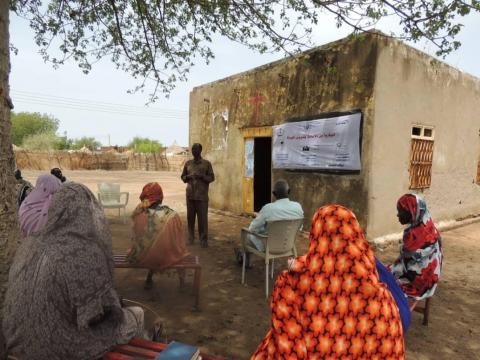
Faith on the frontlines
By Esther Lehmann-Sow
“I feel obligated to the community, to not only provide religious teachings, but also persuade members of my church to take time and understand the risks associated with the novel coronavirus, how the virus spreads, and then making them aware of the various preventive measures.… We use Sundays not just for prayers, but also allocate an hour for education sessions on COVID-19 and for community members to share openly their challenges.” - Pastor Boutros al Nour, chairperson of the Blue Nile Council of Churches, Sudan.
What does it mean to have faith in a time like this, when a pandemic is tearing people’s lives apart, heaping stress and anxiety on children the world over, and for some of us, shaking the foundations of our beliefs? What role or roles do people of faith and faith leaders in particular, have to play?
The short answer is many! Faith leaders are essential partners in relief and development all over the world. In our response to COVID-19, we have so far worked with nearly 95,000 of them to stamp out the spread of dangerous misinformation. Here are just some of the ways their role is unique and vital right now:
1. The voice of authority
We know that when people are faced with conflicting information, they often turn to faith leaders to learn ‘the truth’ and the ‘correct’ behaviour to adopt. From an understanding of vaccinations to safe handwashing or burial practices, and – as in this crisis – social distancing, faith leaders have shown time and again how invaluable their positions of trust are in shifting understanding and behaviour.
2. The correct-information carriers
Given their invaluable influencing role, faith leaders must be truth-tellers – especially in a crisis where misinformation can spread faster than a virus. They have an important role to play to stamp this out and to correct damaging mistruths. As with Ebola, in some of the countries where World Vision works, there has been a lot of stigma associated with COVID-19, especially towards people who are infected or have recovered from the disease. They have been shunned or have heard that becoming sick with COVID-19 is a divine punishment for sin. Early on, we set about mobilising some in our extensive worldwide network of faith leaders to help spread the right information. By using WhatsApp and other mobile approaches, we enabled 8,000 faith leaders to very quickly reach more than 80,000 people in their networks. Many didn’t wait for us; in several countries, leaders we had previously worked with spontaneously used our training and adapted older resources, including virus-spread prevention messages. When they got word of the outbreak, they set out to immediately share information.
3. The key holders
They are indispensable partners and message carriers who increase awareness, improve uptake of recommended behaviour, and decrease stigma. We work with faith leaders so they can use their influence on parents and local governments to adopt behaviours that protect and provide for children. In addition to spreading the right information, we have been training and supporting pastors, priests, and imams to offer support to communities at a time when face-to-face meetings are difficult.
4. The convenors
World Vision’s long history of working with churches means we have strong partnerships with local churches of diverse denominations, as well as leaders of other faiths, based on a shared commitment to improve the well-being of all children. And they don’t work in silos; often they have stronger links with, for example, teachers and healthcare workers. We’ve seen this in the Democratic Republic of Congo where they’re partnering to broadcast lessons via radio.
5. The resilient leaders
Faith leaders have had to deal with low connectivity and prohibitively high costs of mobile phone internet. Despite these challenges, each day they continue to battle low awareness about COVID-19 and try to correct misinformation, which spreads so quickly. Now, more than ever, our Christian faith is a source of hope. The people who are living out their faith by responding to children’s needs throughout this crisis are our hidden heroes. And they might just be able to restore the faith and belief we all need at this time.
Learn more about how we are helping limit the spread of COVID-19 and protect those affected and the impact our programmes have had in the first 100 days.
Esther is World Vision's Partnership Leader for Faith and Development. Follow her @SowEsther